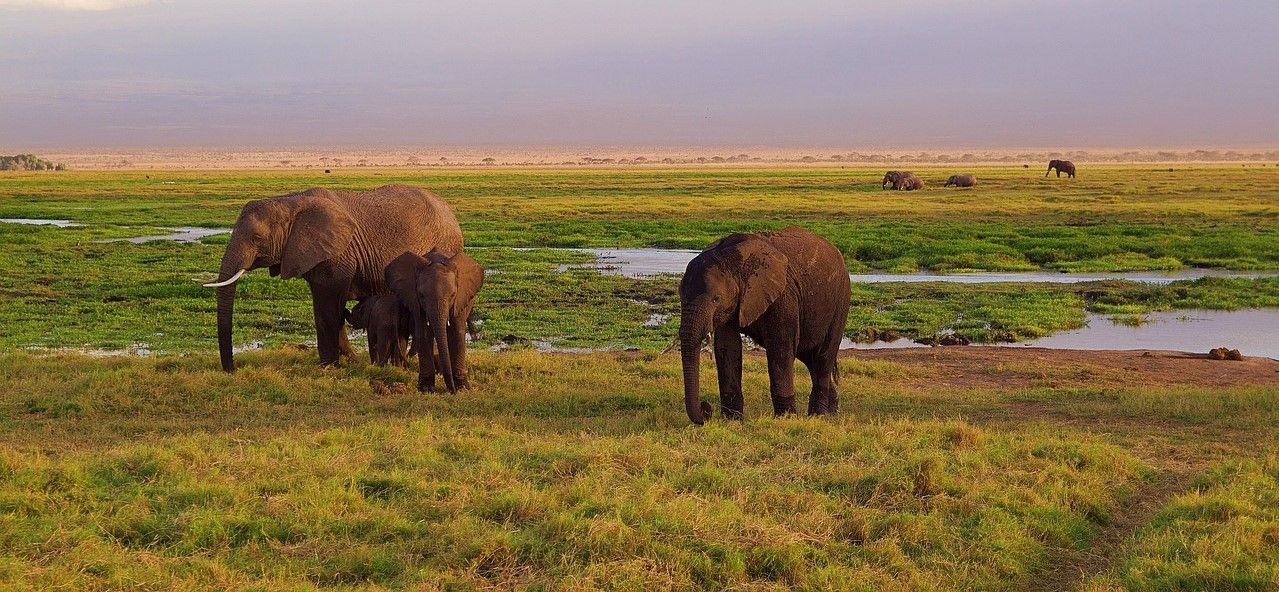Sea creatures in the sea, on the plate and on Näthu
יצא לאור: 28.08.2023
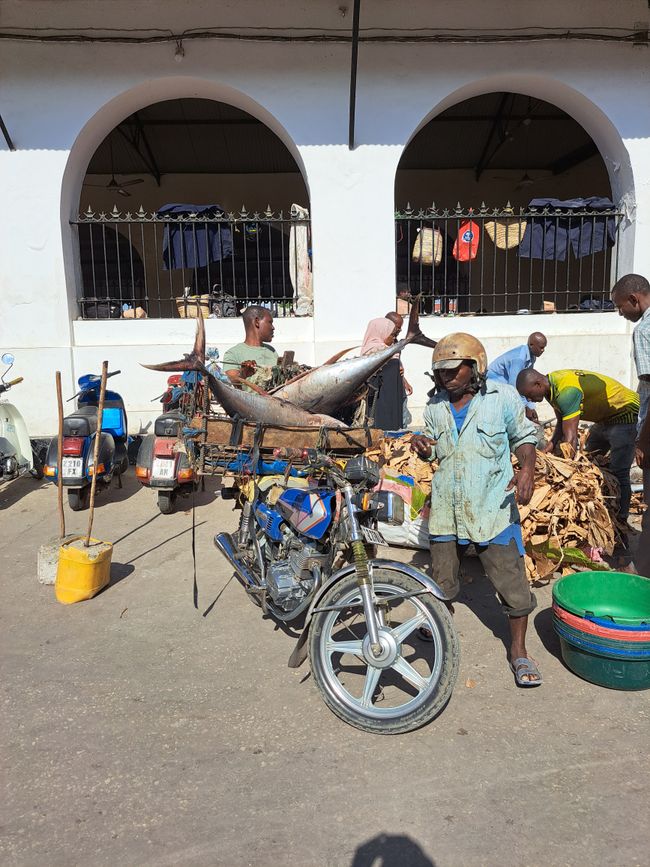
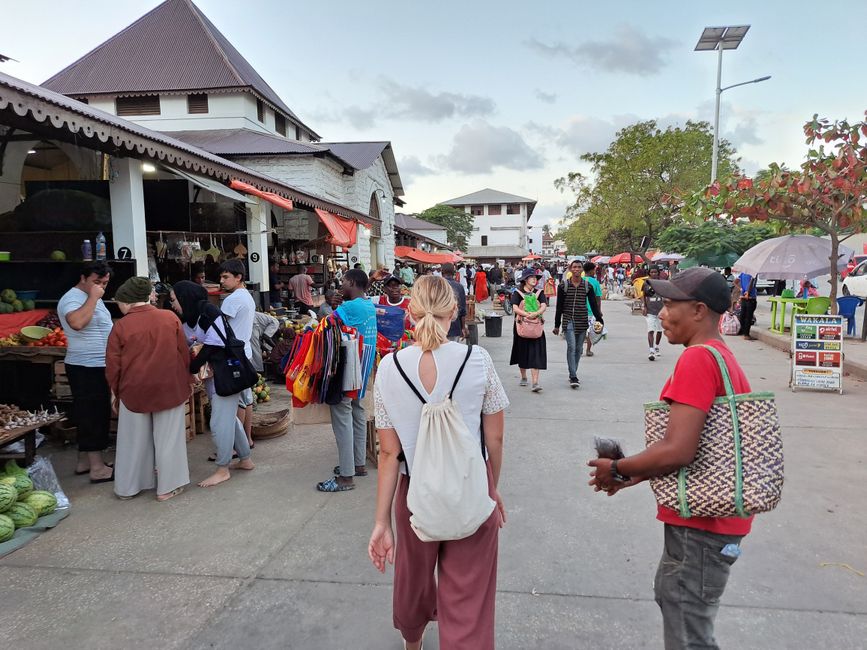
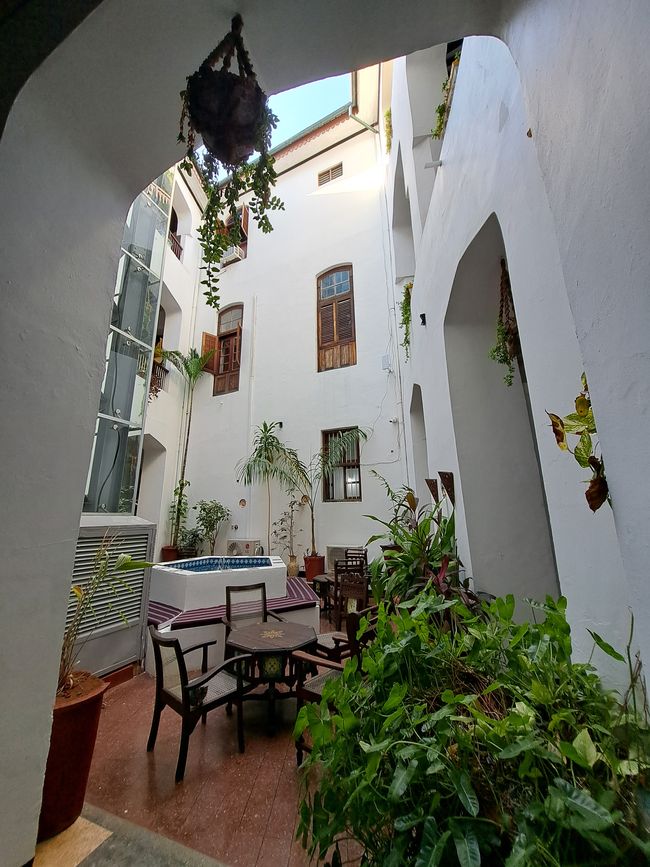
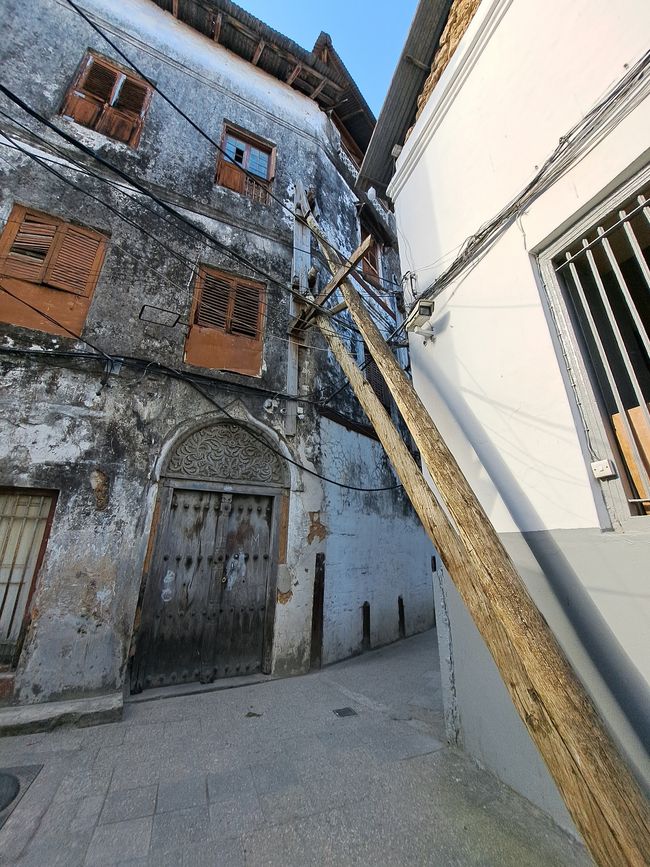
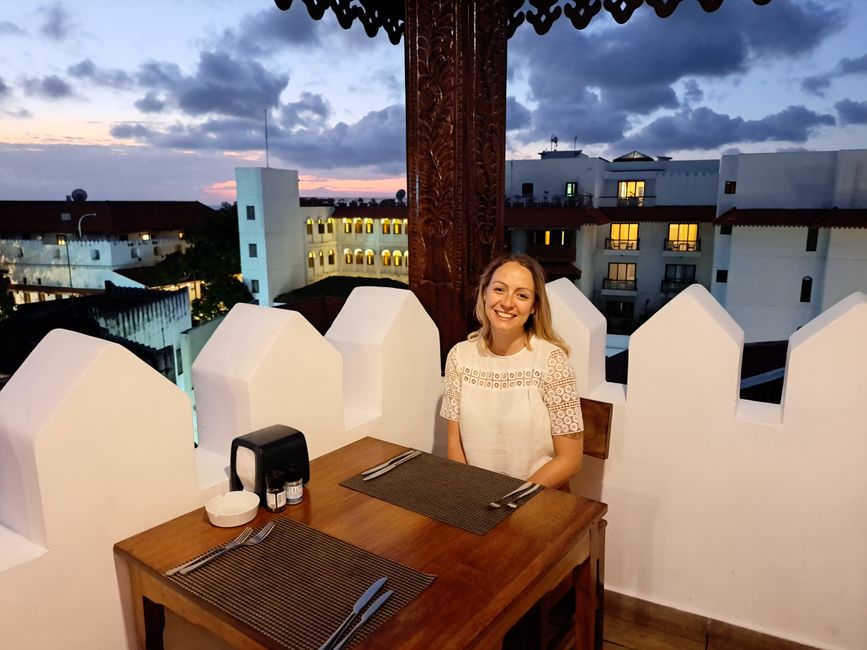
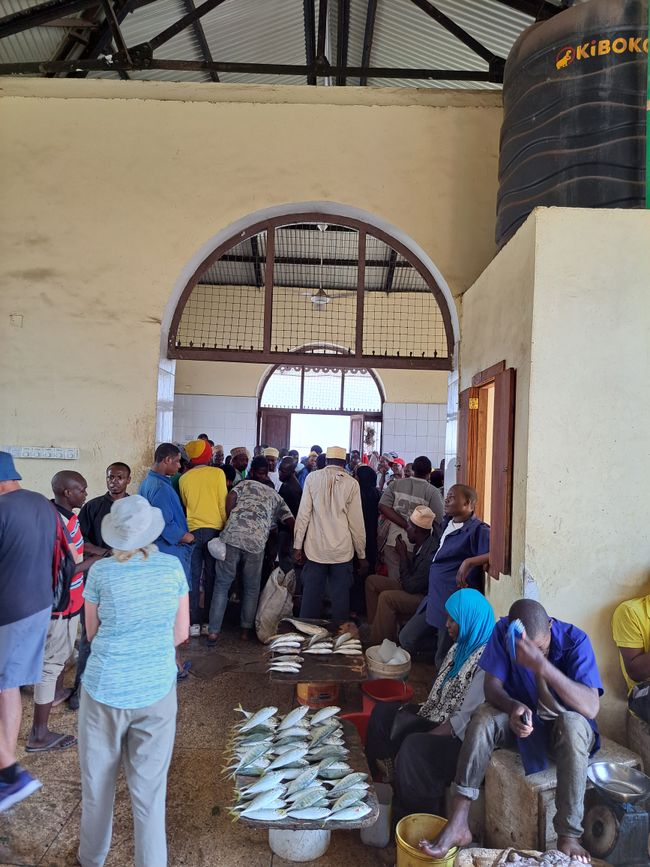
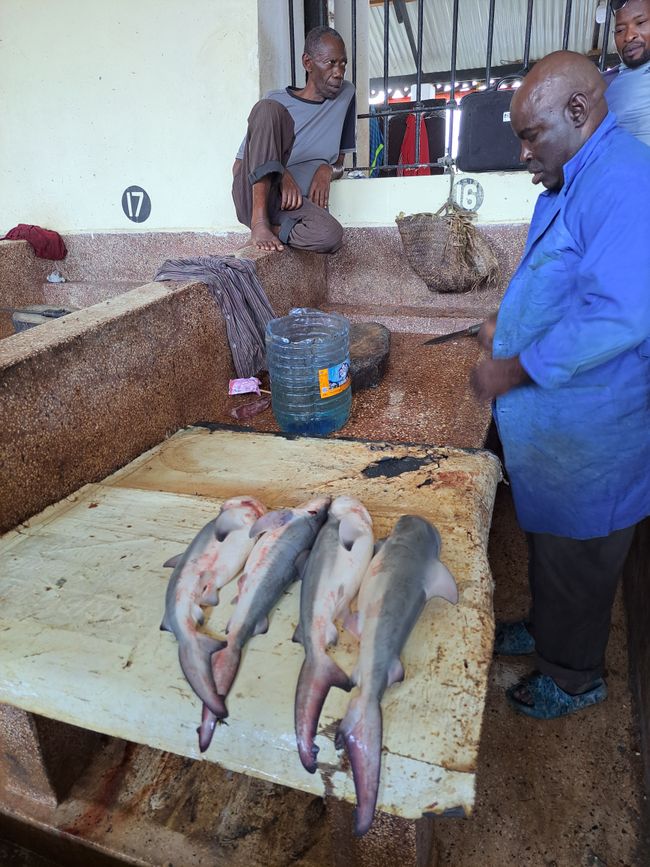
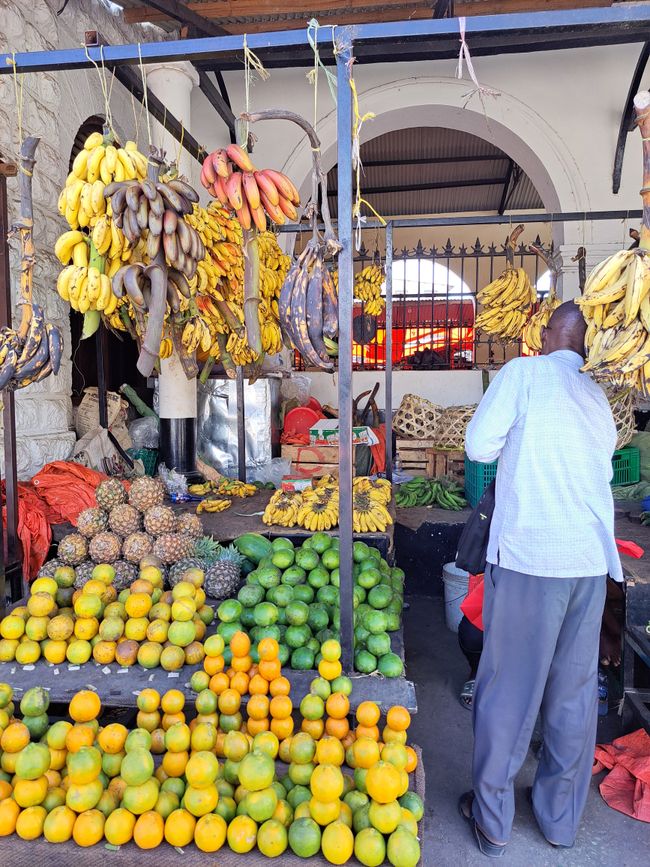
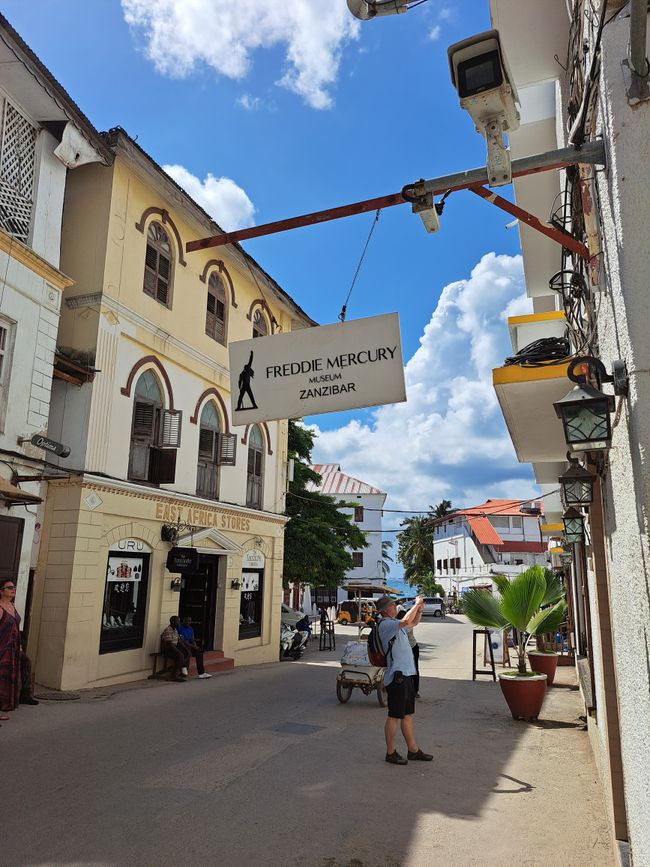
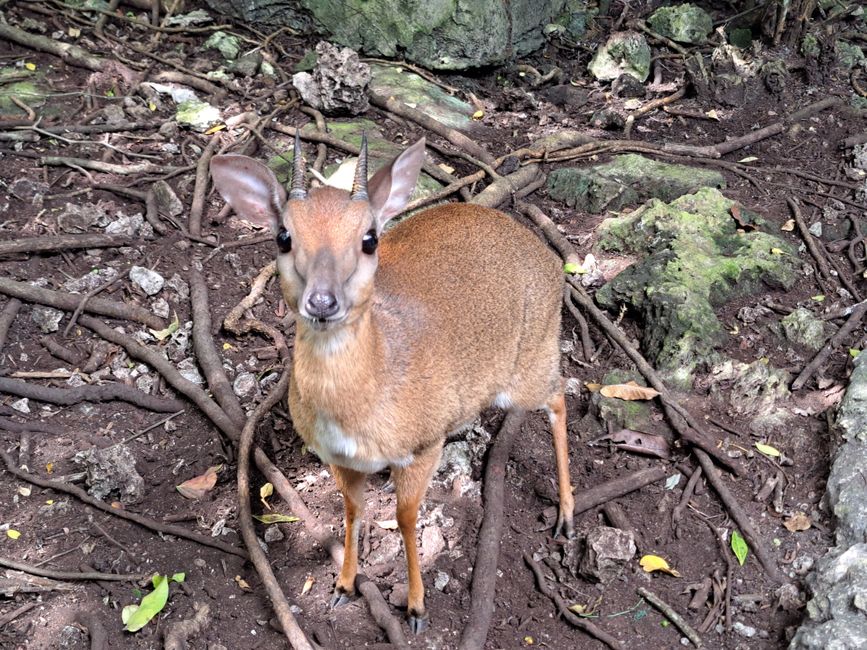
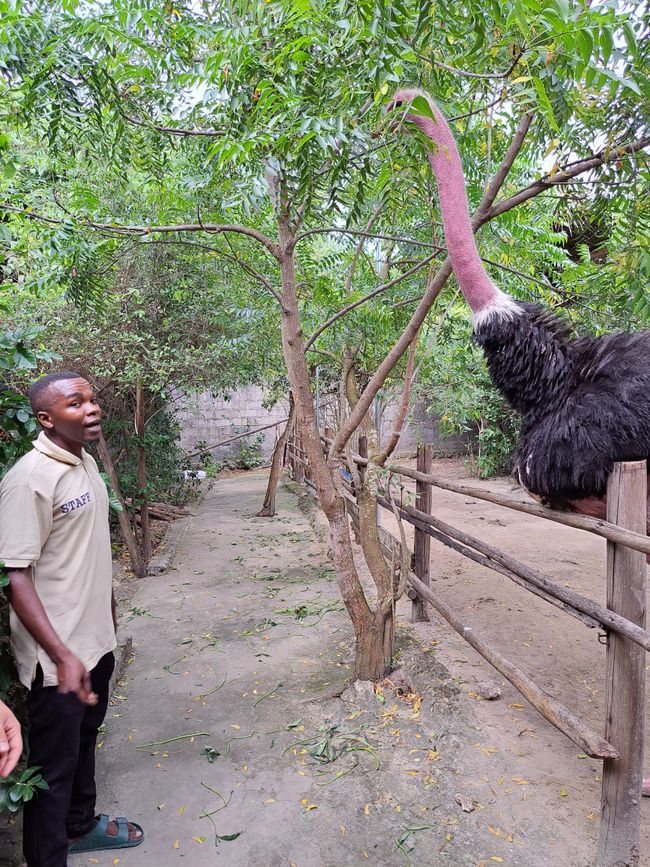
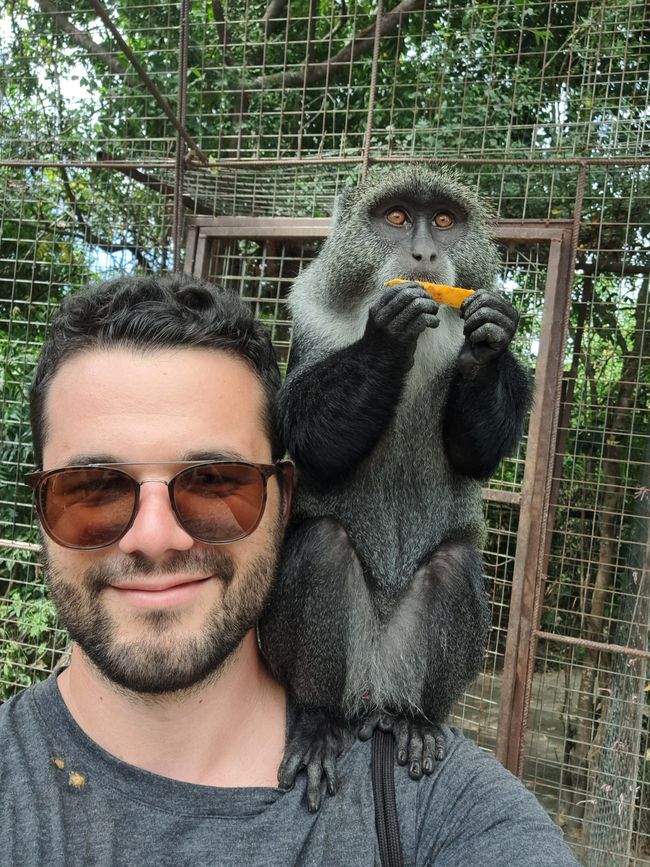
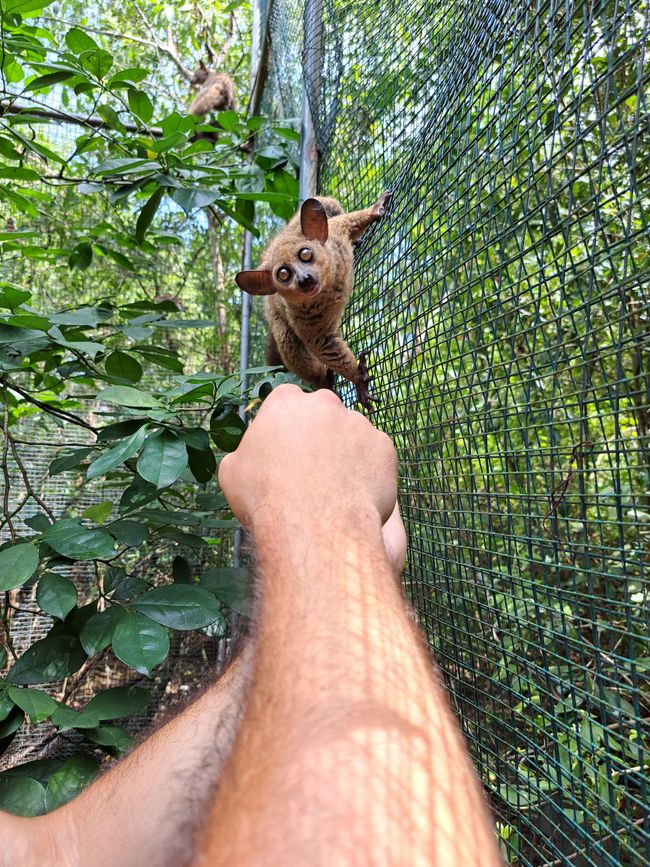
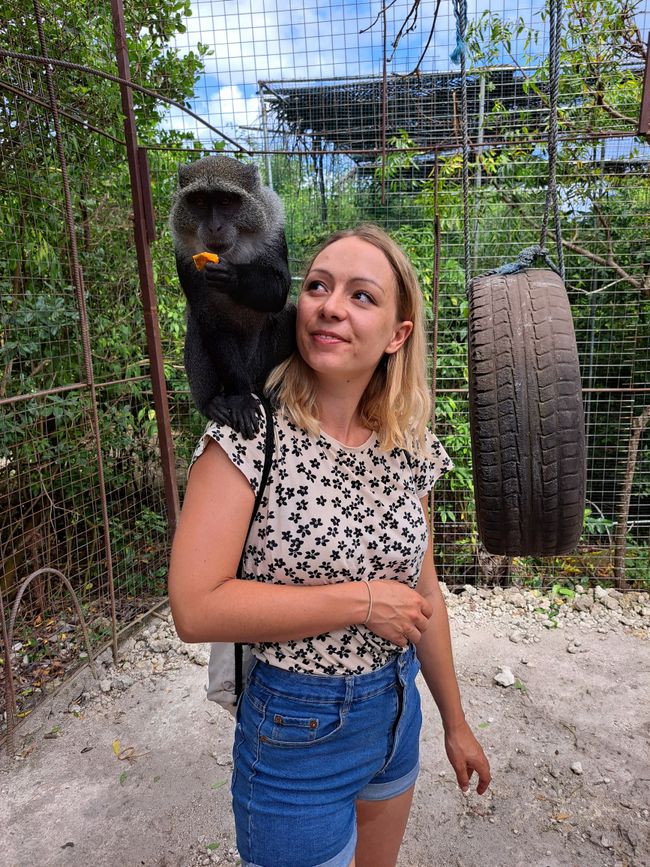
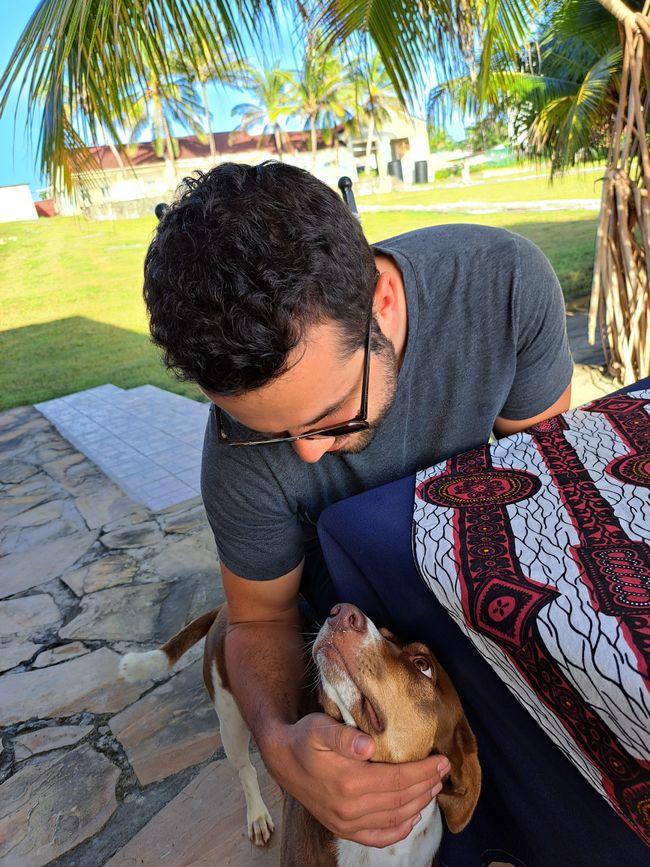
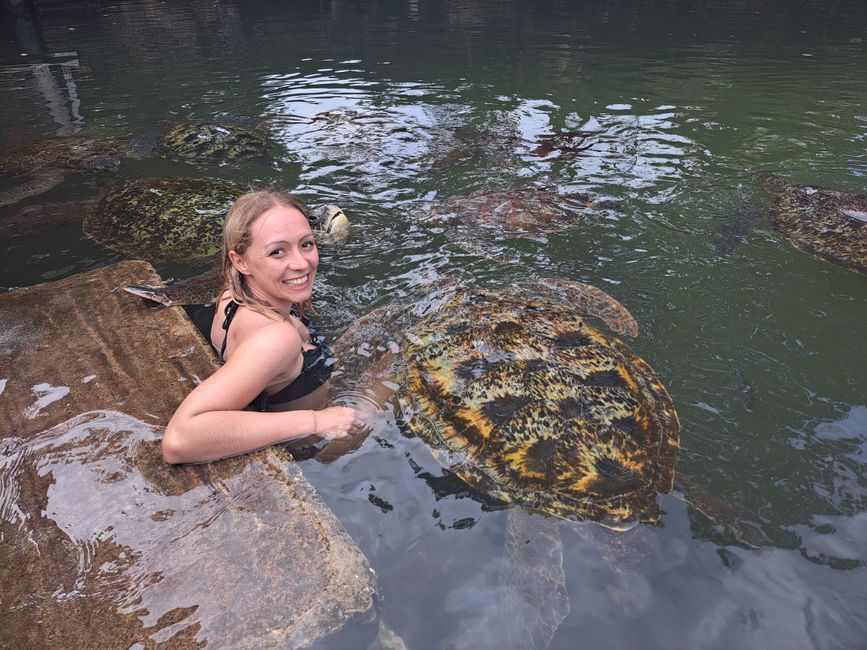
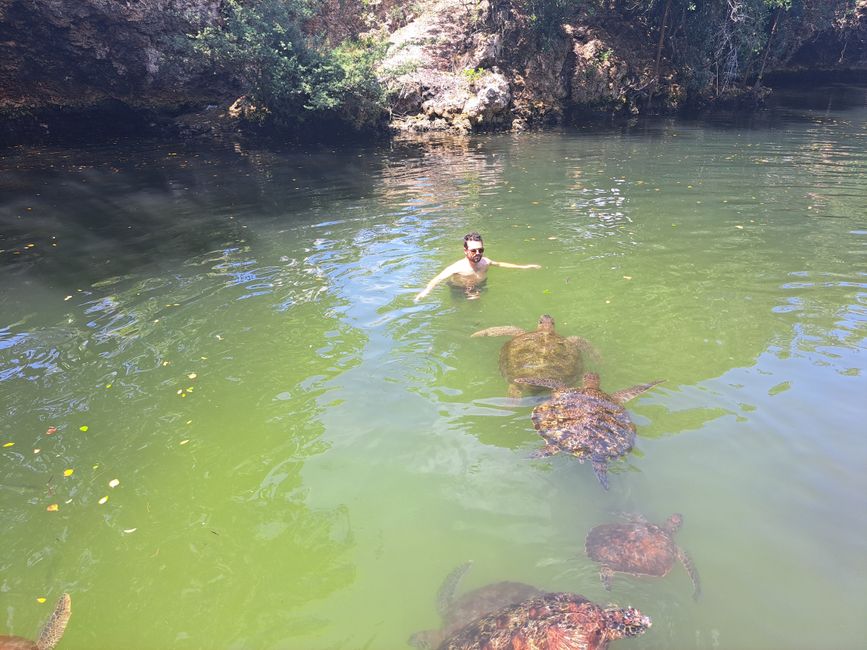
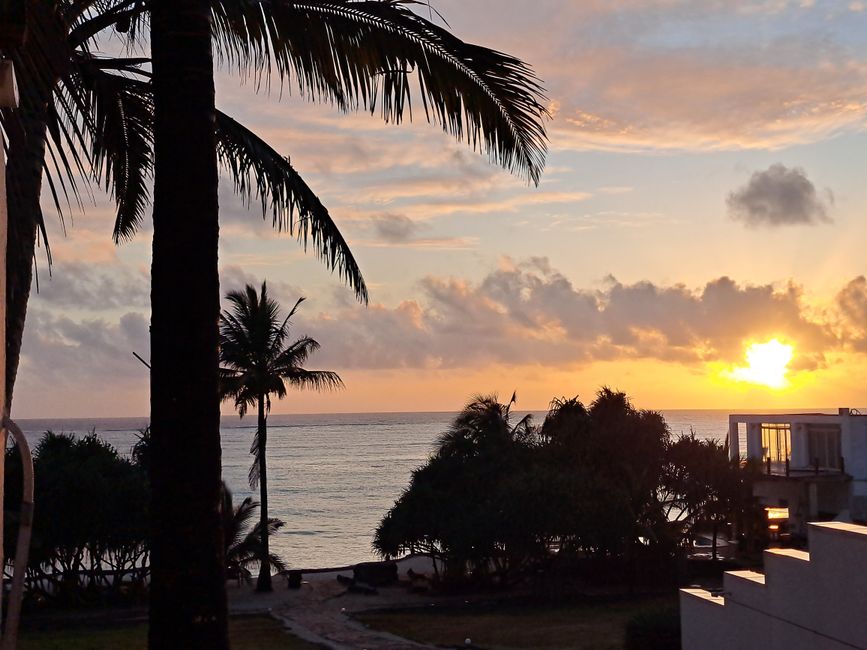
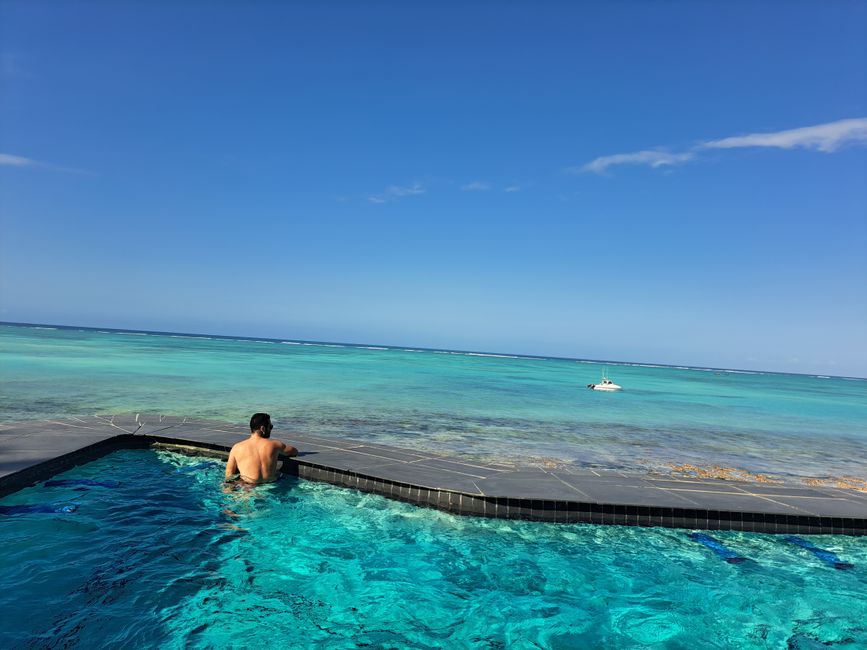
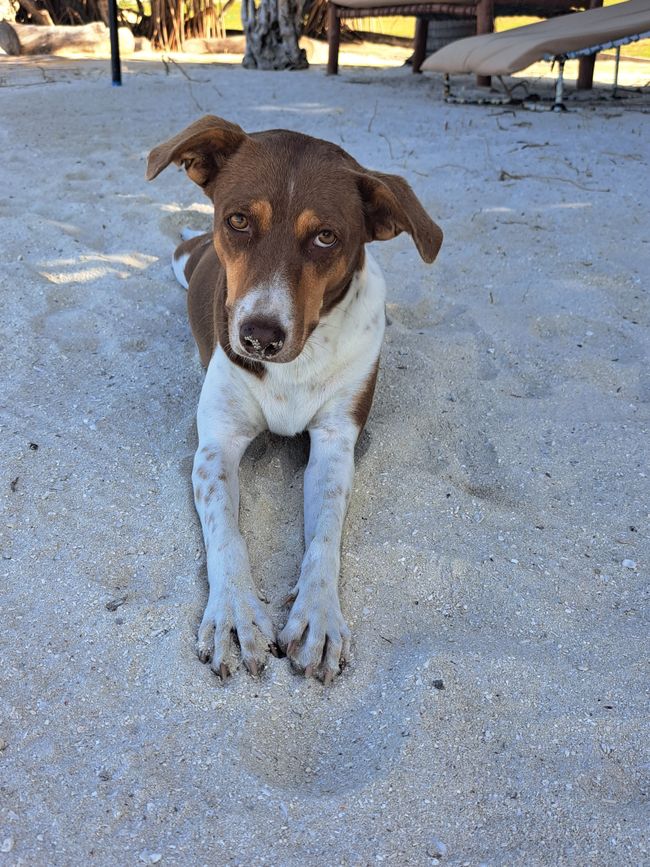
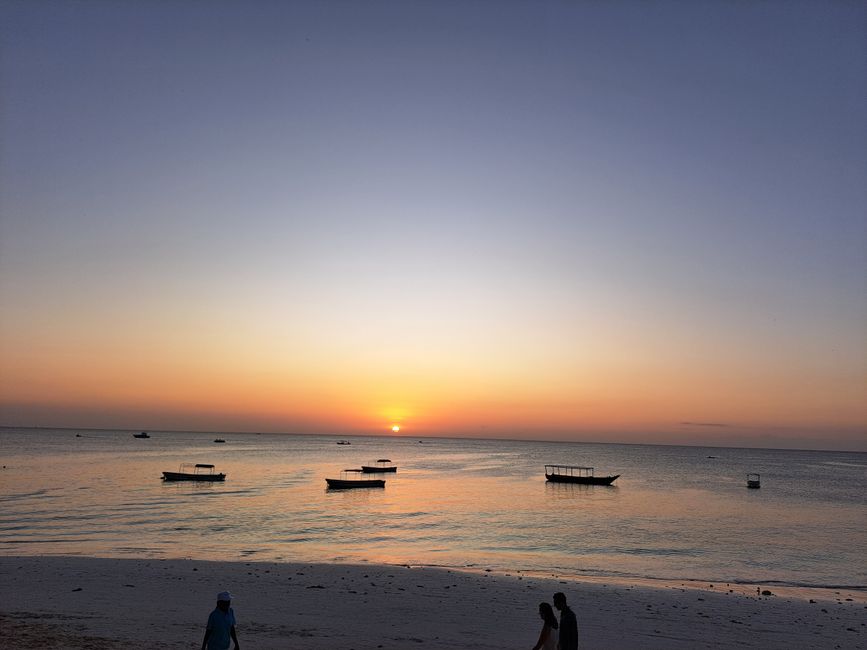
הירשם לעדכונים
We spent the last few days on Zanzibar with three great animal experiences and a lot of chilling.
Although we knew that the dolphin excursion is a huge tourist attraction and we certainly won't be alone, we didn't want to miss it. So we went out to sea in a small boat and soon spotted a school of dolphins (us and about 15 other boats). It was a big hustle and bustle. With snorkeling gear on, we waited on the boat until our guide yelled "jump". We jumped into the water and swam after the dolphins until it was "quick - go go - back in the boat" and the whole thing started all over again. A pretty strenuous procedure that even gave me (Bára) sore muscles in my arms. Nevertheless, it was worth it and under water you don't notice the hustle and bustle at all and just watch the playful dolphins, some of which swam a meter next to and below us. Once they got tired, they dived deep and our boat proceeded to a snorkeling stop. To put it mildly, this was not a highlight. Surrounded by the same 15 boats we were able to snorkel at a spot with dead coral and some fish. The main challenge was not getting a fin or arms in your face as there were just way too many people. After that we went to a quieter place and looked at starfish under the sea. However, that wasn't enough for most idiot tourists, the starfish were taken out for photos, which meant their certain death. However, before I get even more upset about this stupidity, we would like to give a brief insight into the other excursions.
There are two rescue stations for endangered and/or injured animals in Nungwi. One with turtles and one with monkeys, bush babies, snakes, crocodiles, ostriches, antelopes and tortoises. The turtles are in a closed sea bay where you can also swim. When the big animals swim around you, you have a bit of respect at first, but they are very sweet and curious and it was a great experience. Right at the beginning of the second rescue zoo, monkeys jumped on our heads to get food and to play with my (Bára's) hair. They thought it was great to swing back and forth on - I found it mostly painful. In addition to the monkeys, we were also able to feed the ostriches, bush babies and the antelopes. For inexplicable reasons we were not allowed to feed the cobras and crocodiles. However, since the staff was very nice, we won't write a bad review because of that.
Otherwise we went swimming at different beaches and drove into town in the evening to eat and drink beer/cocktails. Most of the time we were (almost) the only guests. It seems that the season in Zanzibar is coming to an end. Of course, that had advantages for us: You could hardly believe that you had such beautiful beaches and places almost to yourself.
As beautiful as Zanzibar is, some of the tourists are just as bad and/or naive. They have an incredibly great need to experience a unique, authentic journey with the most unsurpassable images. Why is it not enough to just enjoy the pure beauty of what you see and experience? It would be impressive enough. No, it always has to be something extra - always bigger, better, more.
This can be observed primarily through two phenomena. 1. Everyone needs to take the best, most amazing, most unique "special Snowflake" picture and 2. have an authentic "experience" and not just do the typical tourist thing.
Let me explain this with some examples:
EVERYWHERE and ALL THE TIME photos are being staged in some way. But that's okay, we do that from time to time. It becomes problematic when negative consequences arise for other living beings. The best example is the one with the starfish. Why on earth do you have to have photos with starfish on your head. Why do you have to have any animals on your head? The locals are well acquainted with this phenomenon. In the zoo we were also offered to take photos with monkeys on their heads, chameleons on their heads and turtles on their heads. The guides were completely amazed when we said we don't need animals on our heads. It was already similar in the safari. It says explicitly that you are not allowed to feed animals, as they can die as a result, but no - the tourists need the greatest photo ever and absolutely have to lure the animals with food, but then start screaming in panic if an animal suddenly does comes close. Mom mia! And what we also have to say: Why are these loud drones needed everywhere?
The second point that makes you think a bit is that many tourists need the feeling that they are super authentic travellers: For example, they have African braids braided, which 95% of Europeans just look super stupid. They befriend the fake Maasai from the beach, and then are stunned when they're later asked for money. Or the Italian family that stayed with us in the hotel is also a good example. They invited a taxi driver, who they said was their friend, to the premises and naively explained to him that the gate would remain open all night and that the rooms would not have a safe. Of course, our hosts were annoyed by this naivety, since they also had to deal with burglaries. Just because you kind of make friends with the locals and do pigtails doesn't mean you have a super authentic experience. You probably don't want an authentic experience either, to be honest. It's more fun in the hotel than in the mud hut. It is also a privilege not to have to drink the tap water and not have to work every single day just to be able to buy food. We tourists wear bathing shoes, take malaria prophylactics and have health insurance and Rega, which picks us up if we feel bad. Trying to walk around "like the locals" or to "befriend" them doesn't change that much, unfortunately. Conclusion: Traveling authentically on Zanzibar is difficult, the differences between the luxury resorts and the locals are huge and tourists are (rightly) seen as money machines.
We spent the last day of the trip in Stone Town, where we did an interesting city tour. The city was first colonized by the Portuguese, then by the Arabs and finally by the Germans and especially the English. It was one of the largest slave trading centers in the world. Until the 1960s, certain locals were still enslaved by Arabs (although it was illegal then).
The different country influences can be seen in the culture, language and even the old buildings and doors. The city is a UNESCO World Heritage Site and therefore protected. However, this leads to the fact that the renovations are far too expensive due to the high regulations and not even the state, let alone the locals, can afford to renovate. The buildings either collapse or are bought up by foreign hotel chains. It's a shame because the locals finally got the city back and soon it will be taken away from them again. What is also interesting is the sewage system. Both the drain from the kitchen (hot oil, detergent, etc.) and from the toilet is simply poured directly into the sea. Thank god we didn't swim there. The sad thing is that because of this, Zanzibar has almost no coral and no fish either. The coast is destroyed.
Speaking of fish: We also went to the fish, meat, fruit and spice markets. The stench of the fish market is indescribable. Various fish are scrambled on dirty ground and sold in a small building. When a vendor chopped up a fish, bits of it landed on Nathu's clothes and skin. For Näthu, the fish lover par excellence (irony), it was a rather unpleasant experience. But the liveliness of the place was super great, even if you have to get rid of someone new every 3 seconds who wants to sell you something.
All in all we are of course sorry our journey is over. We have also settled in well in Zanzibar. We had the Whatsapp number of a motor taxi driver and car taxi driver (for longer distances) that we could text over and over again, got along well with our hosts and knew where the food and cocktails were best. Saying goodbye to Nola hurts the most, the dog in the hotel, who followed Näthu everywhere and was very sweet. The long way home (had to leave at 3 a.m. and didn't arrive in Bern until 10 p.m.) wasn't exactly fun either. However, we are looking forward to seeing our loved ones again and especially to food that does not consist of 90% rice, potatoes, beans and fish. At the same time we are incredibly grateful that this trip went so smoothly and that we stayed healthy the whole time.
Anyone who has managed to read this far: We are impressed! Thank you for your interest and see you soon.
_____________________________
Poslední dny na Zanzibaru jsme strávili třemi skvělými zážitky se zvířaty a spoustou pohody.
Přestože jsme věděli, že výlet za delfíny je velkou turistickou atrakcí a že tam rozhodně nebudeme sami, nechtěli jsme si ho nechat ujít. Vyjeli jsme tedy malou lodí na more a brzy jsme spatřili hejno delfínů (my a asi 15 dalších lodí). Byl to obrovský shon. Se šnorchlovací výbavou jsme čekali na lodi, dokud náš průvodce nezakřičel "skoč". Skočili jsme do vody a plavali za delfíny, dokud se neozvalo "rychle - běž - běž - zpátky na loď" a celé to začalo nanovo. Byla to docela vyčerpávající procedure, ze které mě (Báru) dokonce bolely svaly na rukou. Nicméně to stálo za to a pod vodou člověk vůbec nevnímá ten shon a jen pozoruje hravé delfíny, z nichž někteří pvali metr vedle nás a pod námi. Jakmile se jim už nechtělo, ponorili se do hlubin a naše loď pokračovala dál k zastávce na šnorchlování. To nebyl, slušně řečeno, žádný vrchol. Obklopeni stejnými patnácti loděmi jsme mohli šnorchlovat v místě s mrtvými korály a několika rybami. Hlavní výzvou bylo nedostat ploutví nebo rukou do obličeje, protože tam bylo prostě příliš mnoho lidí. Poté jsme se vydali na klidnější misto a podívali se na Morské hvězdice. To však většině hloupých turistů nestačilo, hvězdice vyndali s more ven a fotili je, což znamenalo jejich jistou smrt. Než se však nad touto hloupostí hlouběji rozčílím, podívejme se krátce na ostatní exkurze.
V Nungwi jsou dvě záchranná centra per ohrožené a nebo zraněné zvířata. Jedno se želvami a druhé s opicemi, křovináři, hady, krokodýly, pštrosy, antilopami a želvami. Vodní želvy jsou v uzavřeném mořském zálivu, kde se da i plavat. Když kolem tebe plavou ty velká zvířata, máš zpočátku trochu respect, ale jsou velmi roztomilá a zvědavá a byl to velký zážitek. V druhé záchranné zoo nám hned na začátku skočily na hlavu opice, aby dostaly jídlo a pohrály si s mými (Bářinými) vlasy. Připadalo jim skvělé se na nich houpat sem a tam - mně to přišlo většinou bolestivé. Kromě opic jsme mohli krmit i pštrosy, mláďata křovinářů a antilopy. Kobry a krokodýly jsme z nějakého nevysvětlitelného důvodu krmit nesměli. Protože však personál byl velmi milý, nedáme jim kvůli tomu špatné hodnocení.
Jinak jsme se koupali na různých plážích a večer jsme šli do města na jídlo a pivo / koktejly. Většinu času jsme byli (téměř) jediní hosté. Zdá se, že sezóna na Zanzibaru se chýlí ke konci. To pro nás mělo samozřejmě své výhody: To, že máte tak krásné pláže a místa téměř sami pro sebe, se vám skoro nechce věřit.
Jak je Zanzibar krásný, tak hrozný a/nebo naivní jsou někteří turisté. Mají neuvěřitelnou potřebu zažít jedinečnou, autentickou cestu s nepřekonatelnými obrazy. Proč nestačí prostě si that vychutnat čistou krásu toho, co člověk vidí a zažívá? Bylo by to dostatečně působivé. Ne, vždycky musí byt něco navíc - vždycky větší a lepší.
To lze pozorovat zejména na dvou fenoménech. 1. Každý si musí udělat tu nejlepší, nejúžasnější, nejunikátnější fotku a 2. with autentický zážitek a nedělat jen typické turistické věci.
Vysvětlím to na několika příkladech:
VŠUDE a VŽDY lidi dělají tisice fotek. Ale to je v pořádku, čas od času to děláme i my. Problematické se to stává, když to má negativní důsledky per jiné živé bytosti. Nejlepším příkladem jsou hvězdice. Proč proboha musíte with fotky s hvězdicemi na hlavě? Proč musíte with na hlavě jakákoli zvířata? Místní obyvatelé jsou s tímto jevem velmi dobře obeznámeni. V zoologické zahradě nám nabízeli, abychom se vyfotili s opicemi na hlavě, chameleony na hlavě a želvami na hlavě. Průvodci byli naprosto překvapený, když jsme řekli, že zvířata na hlavě with nepotřebujeme. V safari to bylo podobne. Je výslovně uvedeno, že zvířata nesmíte krmit, protože je to může zabít, ale ne - turisté potřebují co nejlepší fotku a naprosto nutně musí lákat zvířata jídlem, ale pak začnou panicky křičet , když se k nim zvíře náhle příliš přiblíží. Mom mia! A co take musíme říct: Proč potřebujou lidi všude with ty hlasité drony?
Druhým soil, který mě donutil trochu se zamyslet, je to, že mnoho turistů si potřebuje připadat jako super autentičtí cestovatelé: Například si nechají zapletat africké copánky, které na Evropanech vypadají většinou stejne hloupě. "Spřátelí" se s falešnými Masaji z pláže a pak jsou úplně udivení, když po nich později chtějí peníze. Nebo italská rodina, která s námi bydlela v hotelu, je take dobrým příkladem. Pozvali si do areálu taxikáře, okterém tvrdili, že je jejich přítel, a zcela naivně mu vysvětlili, že brána zůstává otevřená celou noc a pokoje nemají trezor. Naše hostitele tato naivita samozřejmě rozčílila, protože se v minulosti už take museli vypořádat s vloupáním. To, že se tak trochu spřátelíte s místními a děláte si copánky, ještě neznamená, že má človek super autentický zážitek. A pokud jsme upřímní, tak o autentický zážitek nejspíš ani nikdo nestojí.
V hotelu už je to jednodušší než v bahenní chatě. Je take výsadou, že nemusíme pít vodu z kohoutku a nemusíme každý den pracovat, jen aby jsme si mohli koupit jídlo. My tourist nosíme koupací boty, bereme preventivně léky proti malárii a máme zdravotní pojištění a letadlo, která nás vyzvedne, když nám nebude dobře. Snaha chodit "jako místní" nebo se s nimi "spřátelit" na tom bohužel mnoho nezmění. Závěr: Autentické cestování po Zanzibaru je vice mene nemožné, rozdíly mezi luxusními resorty a místními jsou obrovské a turisté jsou (právem) vnímáni jako stroje na peníze.
Poslední den cesty jsme strávili ve Stone Townu, kde jsme absolvovali zajímavou prohlídku mesta. Město bylo nejprve kolonizováno Portugalci, poté Araby a nakonec Němci a především Anglicany. Bylo to jedno z největších center obchodu s otroky na světě. Až do 60. let 20. století byli někteří místní obyvatelé stale zotročováni Araby (i když to již tehdy bylo nelegální).
Vlivy různých zemí jsou patrné v kultuře, jazyce a dokonce i ve starých budovách a dveřích. Město je zapsáno na seznamu světového dědictví UNESCO, a proto je chráněno. To však znamená, že renovace jsou kvůli vysokým předpisům příliš nákladné a nemůže si je dovolit ani stát, natož místní obyvatelé. Takže budovy se buď rozpadají, nebo je kupují zahraniční hotelové řetězce. Je to škoda, protože konečně místní ziskali město zpět a brzy jim bude opět odebráno. Zajímavá je take kanalizace. Jak splašky z kuchyní (horký olej, saponáty apod.), tak ze záchodů se jednoduše vylévají přímo do more. Ještě že jsme se tam nešli koupat. Smutné je, že kvůli tomu na Zanzibaru nezůstaly téměř žádné korály ani ryby. Pobřeží je zničené.
Když už jsme u těch ryb, zašli jsme take na trh s rybami, masem, ovocem a kořením. Zápach rybího trhu je nepopsatelný (jako že v negativním smyslu). Na špinavé zemi se porcují různé ryby a prodávají se v malé budově. Když every prodavač rozsekal rybu, její kousky přistály Näthikovy na oblečení a kůži. Pro Näthika, milovníka ryb par excellence (irony), to byl dost nepříjemný zážitek. Ale živost místa byla skvělá, i když se musíte každé tři vteřiny zbavovat někoho nového, kdo vám chce něco prodat.
Celkově je nám samozřejmě lito, že náše cesta skončila. Na Zanzibaru jsme se take dobře zabydleli. Měli jsme číslo na Whatsapp na řidiče motorového taxi a řidiče automobilového taxi (na delší vzdálenosti), kterým jsme mohli znovu a znovu psát, dobře jsme si rozuměli s našimi hostiteli a věděli jsme, kde je nej lepší jídlo a koktejly. Nejvíce nás bolelo loučení s Nolou, psem v hotelu, který hlavne miloval Näthika a následoval ho všude, kam šel. Dlouhá cesta domů (odjížděli jsme ve tři ráno a do Bernu jsme dorazili ve 22 hodin) nebyla zrovna veselá. Těšíme se však na další setkání s našimi blízkými a hlavně na jídlo, které není z 90 % tvořeno rýží, bramborami, fazolemi a rybami. Zároveň jsme nesmírně vděční, že tato cesta proběhla tak hladce a že jsme po celou dobu zůstali zdraví.
Komu se podařilo dočíst až sem: Jsme ohromeni! Děkujeme za váš zájem a brzy na viděnou.
הירשם לעדכונים
תשובה (1)
Jarmila
Moc moc děkujeme za úžasné zpravodajství z dovolené!!!🙏🏻🍀✊🏻Bylo to výborně napsané a neuvěřitelně vtahující! Díky❤️❤️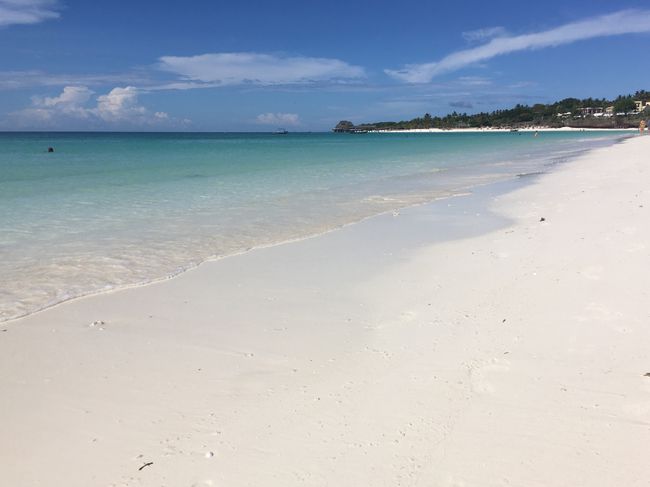
דוחות נסיעות טנזניה
